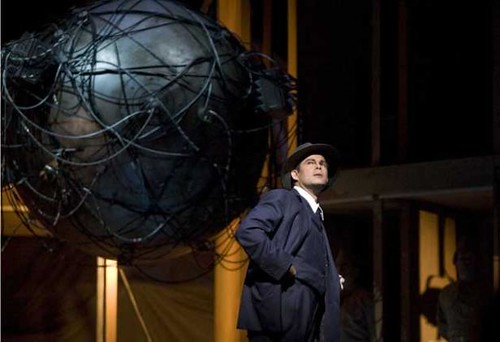
(Gerald Finley)
Em 2005, em São Francisco (Califórnia), Doctor Atomic, do minimalista John Adams, via a luz do dia.
«The opera tells the story of the last phase of the 1945 atom-bomb test at Los Alamos, and specifically focuses on the physicist J Robert Oppenheimer, a sensitive, spiritual, liberal man who was nevertheless prepared to develop a weapon of mass destruction. In early planning, Doctor Atomic was also going to deal with Oppenheimer's remorse after Hiroshima and his run-in with McCarthyism. But, after Adams fell out with the original librettist Alice Goodman, Peter Sellars (who also directed the San Francisco production) created a script that makes what seem to me two crucial errors – the text was assembled from actual historical documents, bumped up with poetry associated with the characters in question; and the opera is brought to an end with the first test explosion.»
Quatro anos volvidos sobre a première, eis que Doctor Atomic é levada à cena na English National Opera (ENO). Peter Sellars havia assinado a encenação de São Francisco. Para a estreia da mesma peça em terras de Sua Majestade, a ENO – em parceria com o Met – apresenta uma encenação de Penny Woolcock. Consta que esta última proposta cénica arruma a um canto a original:
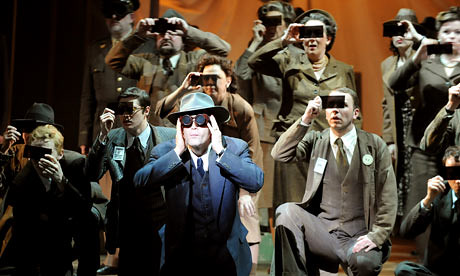
(cena de Doctor Atomic, ENO 2009)
«Woolcock's naturalistic staging, with designs by Julian Crouch and carefully gauged video projections, is far less cluttered and tendentious than Sellars's original, doing away entirely with the mimsy, inappropriate choreography.»
A critica é consensual quanto à elevada qualidade do trabalho de Penny Woolcock, bem como no tocante à prestação de Gerald Finley como protagonista da trama, ossia Oppenheimer:
«Gerald Finley plays the troubled J Robert Oppenheimer, whose "Batter My Heart" setting is surely the finest aria written since Puccini. Over a huge range, Finley's voice has no discernible gear-shifts or squeezed notes. His seriousness and sensitivity are affecting.»
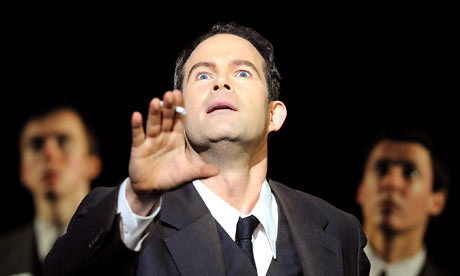
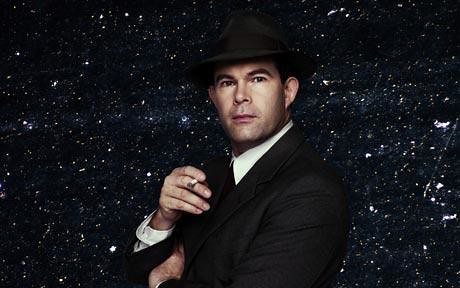
(Gerald Finley como J.R. Oppenheimer, em Doctor Atomic)
Sem rival no papel titular de Doctor Atomic, eis algumas interessantes considerações de Gerald Finley – excelso barítono canadiano – a respeito da ópera de Adams:
«At the heart of the opera is Oppenheimer's doubt about what the team is about to let loose on the world. "It is like a Greek tragedy," says Finley. "The characters do not understand the whole picture, but the audience knows the outcome, knows the repercussions, knows that nuclear strength is still something that dominates our lives. They know what happened to Oppenheimer, too, about the relationships, the betrayals. But Oppenheimer doesn't know these things. It is very important for me not to show him displaying regret or vulnerability based on later knowledge. He is opening a door to the unknown. That's fundamental."
Like all operas dealing with historical events, Doctor Atomic has to balance the need to tell a story with the operatic imperative for characters to reflect on what happens to them. "Great characters in history have great dilemmas," says Finley. "And Oppenheimer was an epic example. He had an immensely rich intellectual and meditative life. He knew what he wanted for Los Alamos and he knew that the free world might depend on whether or not he did a good job. That's why the soliloquy is such a necessary mode for him. Without it, the opera would simply be a documentary. It is far more interesting for me - and, I think and hope, for the audience - to see the dilemmas the characters face."
Finley's father was wounded during the landings in 1944. "He found it very difficult to talk about it. He wouldn't glorify it. His great phrase was 'Respect reticence.'" But Finley believes that, as our distance from those times increases, it is possible to see even that sort of subject operatically. "It's not an attempt to represent the entire story, and it shouldn't be judged on that. It's an attempt to find a way back into some very painful and important things that our parents' generation had to face."»
«At the end of the first act of John Adams’ Doctor Atomic, J. Robert Oppenheimer – harbinger of mass destruction – is suddenly confronted by the enormity of what he has created.
Invoking the words of John Donne – his Holy Sonnet “Batter my heart, three-person’d God” – he hurls out his challenge to the Almighty amidst a rush of shrill, pulsating, fanfares. At this moment he is the loneliest man in the universe and in high baroque style John Adams lays bare his agony. This aria, heart-rendingly sung by Gerald Finley, is the detonation in Oppenheimer’s soul which triggers the big bang. You can already find it on You Tube and it might just be the single most beautiful thing Adams has ever written.
(…)
One of Adams’ theatrical tricks here – and as a composer with such an innate understanding of theatre he always has one or two up his sleeve – is his way of setting the mundane or impossibly complex to music of great beauty and simplicity. A chorus describing the process of nuclear fission assumes the tranquillity of a Bach chorale; a description of the effects of radium on the human body is so lyrical as to be almost sensuous.
There are two distinct kinds of music in Doctor Atomic: the busy, impatient, dryly kinetic music of scientific theory (and Adams harnesses his orchestra like a force of nature) and that which foreshadows and confronts the emotional consequences of the scientists’ actions. Oppenheimer found his refuge in poetry and in the intimate second scene of the opera with Kitty, his wife (Sasha Cooke, bravely negotiating the challenging vocal compass of the role) the heady poetry of Charles Baudelaire demands and gets an effusion of lyricism.
(…)
No praise can be too high for the chorus work, still more that of the orchestra which, under Lawrence Renes, is forever powering towards, in Oppenheimer’s words “a brilliant luminescence”, trumpet-topped and grimly magnificent. As to individuals, Finley’s chain-smoking Oppenheimer is a model of edgy practicality, Brindley Sherratt towers as Edward Teller, and Thomas Glenn as wiry Robert Wilson is the unsettling voice of doubt.
The second act of dreams, premonitions, and predictions can only end one way and Adams’ real-time approach to “the shot” is an unbearably intense crescendo. How fitting then that the music of the final words – “Can I have some water?” in Japanese – is the saddest of the evening.»
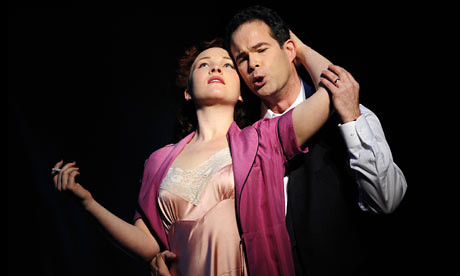
(Finley e Cooke, ossia o casal Oppenheimer)
tou a imaginar uma crítica estrangeira sobre os "das märchen" do emanuel nunnes...
ResponderEliminarTalvez veja esta produção dentro de 2 semanas, se a disponibilidade dos bilhetes assim o permitir! :)
ResponderEliminarI am seeing this on the 16th March and am really looking forward. Thank you for the all-round appraisal.
ResponderEliminar«Gerald Finley plays the troubled J Robert Oppenheimer, whose "Batter My Heart" setting is surely the finest aria written since Puccini." Fui ouví-la e discordo. Strauss (Capriccio), Poulenc (Les Dialogues des Carmelites), Nielsen, Gershwin estão muitos degraus acima. Na ária a escrita para a voz é repetitiva e banal. O acompanhamento orquestral é mais elaborado.
ResponderEliminar